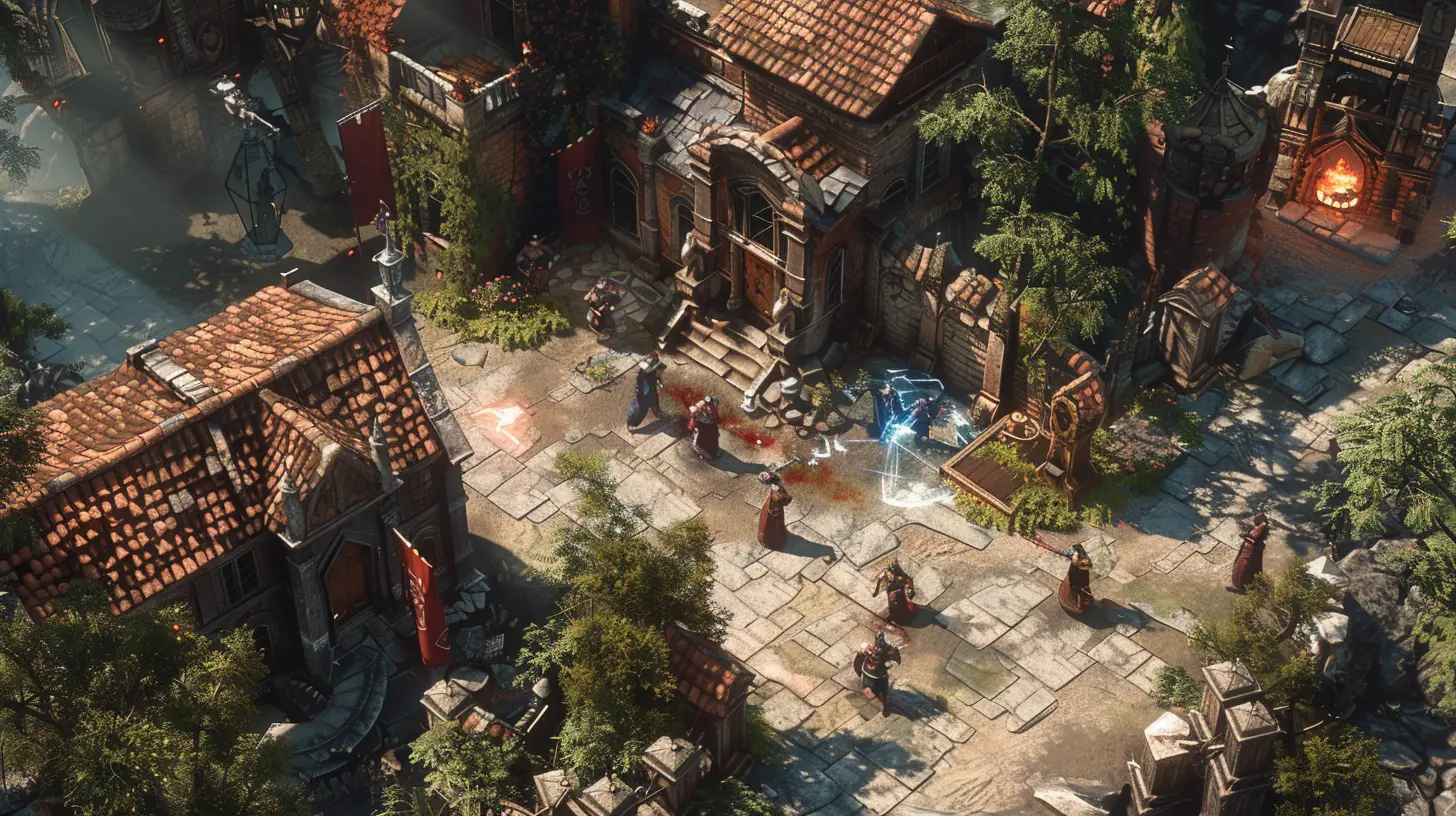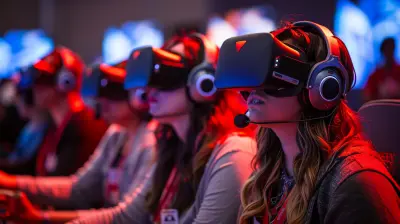Real-Time vs Turn-Based Combat in RPGs: A Comprehensive Look
15 July 2025
Let’s face it: the world of RPGs is massive, and no two players are alike. Some of us love the thrill of fast-paced action, while others enjoy the satisfaction of meticulously planning every move. That’s where the great debate lies—real-time vs turn-based combat. Which style reigns supreme? That’s a tricky question because, honestly, it all boils down to personal preference. But hey, let’s break it down and really dive into what makes each combat style shine. Whether you're a seasoned RPG fanatic or dipping your toes into the genre for the first time, this article will help you understand the pros and cons of these two combat systems and (hopefully) settle the score. 
The Basics: What Are Real-Time and Turn-Based Combat?
Before we dive into the nitty-gritty, let’s clarify what we’re talking about here. When we say real-time combat, we’re talking about combat systems that play out dynamically, without pauses. You’re making split-second decisions and reacting to your enemies in real-time (hence the name). Think of games like The Witcher 3 or Dark Souls.On the flip side, turn-based combat takes place in a more structured, stop-and-think kind of way. Players and enemies take turns executing actions, and you’ve got all the time in the world to carefully plan your next move. Final Fantasy Tactics or Divinity: Original Sin 2 are classics in this category.
Both styles have their merits, so let’s dig into what makes them tick. 
Why Gamers Love Real-Time Combat
The Thrill of the Fight
Let’s be honest—real-time combat is exhilarating. It puts you right in the heart of chaos, and there’s nothing quite like dodging a fireball by a hair’s breadth or landing that perfectly-timed counterattack. Every battle feels organic and unpredictable.Real-time combat is essentially about instinct and reflexes. It rewards players who can think on their feet and respond to situations quickly. It’s like playing a high-stakes game of dodgeball, except instead of balls, it’s swords, spells, or arrows flying at you.
Immersion Overload
One major win for real-time combat is how immersive it is. Because there are no breaks in action, you stay fully engaged in the moment. Every swing of the sword, every spell cast—it’s all happening seamlessly, just as it would in the game’s world.Games like The Elder Scrolls V: Skyrim absolutely nail this. You feel like you’re living out a fantasy life, fighting dragons and bandits in real time. It’s raw, it’s gritty, and it pulls you into the world like few other systems can.
The Adrenaline Factor
There’s a reason why so many action RPGs feature real-time combat—it’s exciting! The constant flow of action keeps your heart racing and your attention locked in. If you’re the type of player who loves a challenge and thrives under pressure, real-time combat can be downright addictive.
The Case for Turn-Based Combat
Strategy Is King
If real-time combat is a chaotic dance, turn-based combat is a carefully orchestrated chess match. Here, the focus isn’t on reflexes but on strategy. You’ve got time to assess the situation, weigh your options, and plan out your moves.Turn-based combat gives you a sense of control that real-time systems simply can’t match. You’re not just reacting to what’s happening—you’re actively shaping the battlefield, anticipating enemy moves, and executing perfectly crafted strategies.
Take XCOM 2 as an example. Every choice matters, and one wrong move can doom your squad. It’s stressful, sure, but in that good, "edge-of-your-seat" kind of way.
Accessibility
Here’s another thing: turn-based combat is generally more accessible for newcomers. Not everyone has lightning-fast reflexes or the muscle memory to pull off perfect combos. Turn-based games let you play at your own pace, making them ideal for players who are new to RPGs or just prefer a more relaxed experience.Plus, it’s perfect for those moments when life interrupts you mid-game. Need to get up and take a quick snack break? No problem—your turn will still be waiting for you when you get back.
A Deeper Connection
Because turn-based games slow things down, you often end up more invested in the characters, story, and intricacies of the game world. Combat doesn’t just feel like button-mashing—it feels like a critical narrative moment.Remember Persona 5? Every fight feels like an extension of the story because you’re not just battling for the sake of battling. You’re making calculated decisions that impact how the story progresses and connects with the characters on a personal level. 
Breaking Down the Pros and Cons
Alright, let’s get straight to the point. Here’s a quick comparison of real-time and turn-based combat for those of you who like your info at a glance:| Aspect | Real-Time Combat | Turn-Based Combat |
|-----------------------|-----------------------------------------------|----------------------------------------------|
| Pacing | Fast and chaotic | Slow and methodical |
| Skill Required | Reflexes and reaction time | Strategic thinking and planning |
| Immersion | High, feels immediate and intense | Moderate, focuses more on mechanics |
| Accessibility | Can be overwhelming for newcomers | Friendly for all types of players |
| Replayability | Relies on mastering mechanics | Encourages experimenting with strategies |
Both styles have strengths and weaknesses, and their appeal often depends on what you’re looking for in a gaming experience.
Can’t We Just Have Both?
Here’s the kicker: why not both? A lot of modern RPGs are blending these two styles into hybrid systems, giving players the best of both worlds.Take Final Fantasy VII Remake, for example. It features real-time combat but allows you to pause and issue commands in the heat of battle. It’s a fantastic compromise that appeals to both sides of the aisle.
Similarly, games like Dragon Age: Inquisition offer tactical "pause-and-play" mechanics. You can play in real-time or slow things down to carefully plan your moves. It’s kind of like having your cake and eating it too.
This hybrid approach is becoming more common, proving that game developers are listening to the community and finding ways to cater to diverse playstyles.
Which One Is Right for You?
So, what’s the verdict? Should you go for real-time or turn-based combat in your next RPG adventure? Honestly, there’s no right or wrong answer—it’s all about what you enjoy.Do you crave an adrenaline-fueled experience where your reflexes are put to the test? Real-time combat is calling your name. But if you’d rather take your time, flex your strategic muscles, and savor every decision, turn-based combat will feel like home.
At the end of the day, the beauty of RPGs lies in their variety. Whether you’re a fan of fast-paced action or deliberate tactics, there’s an RPG out there that’s perfect for you. And hey, maybe you’ll even discover that you enjoy both styles depending on your mood. Remember, gaming is all about having fun—so pick up that controller (or mouse and keyboard) and dive in!
Final Thoughts
Real-time and turn-based combat systems each bring something unique to the RPG table. They cater to different playstyles, different moods, and different gamers. Whether you're slashing your way through enemies in a frenzy or carefully plotting every move in a tactical showdown, both systems offer unforgettable experiences.So, the next time someone asks you, “Which combat style is better?” just smile and say, “Why not both?
all images in this post were generated using AI tools
Category:
Role Playing GamesAuthor:

Madeleine McCaffrey
Discussion
rate this article
2 comments
Vanya Baker
Fascinating exploration! Both combat styles have unique strengths. I’m curious how player preferences shape game design—do you think one style appeals more to certain audiences?
October 31, 2025 at 6:15 AM

Madeleine McCaffrey
Thank you! Player preferences definitely influence game design, as real-time combat often appeals to those seeking fast-paced action, while turn-based systems attract players who prefer strategy and careful planning.
Noora McCord
Both combat styles offer unique thrills! Embrace the strategy of turn-based and the excitement of real-time for unforgettable adventures!
July 20, 2025 at 4:53 PM

Madeleine McCaffrey
Absolutely! Each style brings its own excitement and strategy, enhancing the RPG experience in unique ways.


